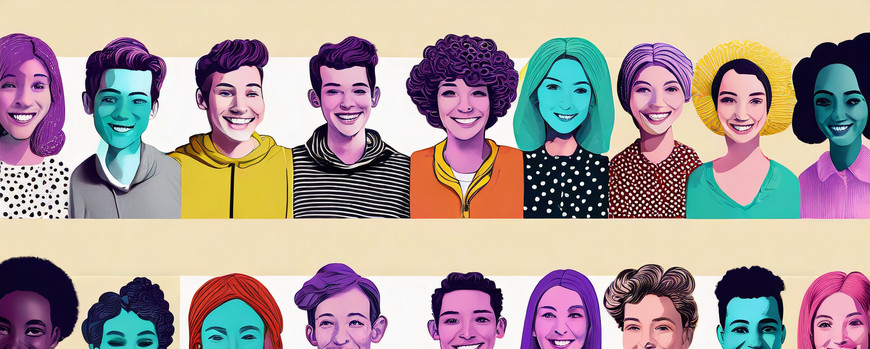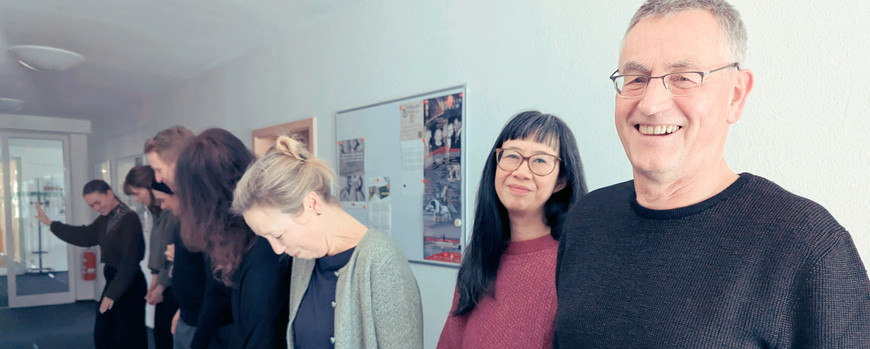Denkwerkstatt Language Worlds at School
Language Worlds an School - Displacement, Immigration and Heterogeneity
The Denkwerkstatt "Language Worlds an School - Displacement, Immigration and Heterogeneity" aims to build a toolbox to enable confident communication about emotions and cultural norms in the German language with the end goal of reducing conflicts in the school environment.
Denkwerkstatt is
- a miniature Think Tank for teacher training students and students of Linguistik im Kontext (focus DaF/DaZ), Inclusice/Special Education (secondary level), Educational Sciences (secondary level), Inclusive Education (primary level), Psxchology (Inclusive Education)
- was created to endow students with urgently needed skills that go beyond the curriculum
- a place where students can exchange ideas and support each other
- a place where specific ideas can be developed and presented
How does Denkwerkstatt work?
- concieved for 5 students
- run over a period of 12 months
- is connected with the University Scholarship, students recieve a monthly stipend of 300€
- will regularly communicate with selected scholars
- requires a working time of ca. two hours per week
Intro to Linguistic Multiplicity: Denkwerkstatt Nurtures Creative Ideas for inclusive School Education
Opening Workshop of Denkwerkstatt "Language Worlds at School - Displacement, Immigration and Heterogeneity"
11. Februar 2025
The opening workshop of Denkwerkstatt "Language Worlds at School - Displacement, Immigration and Heterogeneity" saw committed students and experts come together to develop new approaches to the challenges of school (language) education. This miniature Think Tank was concieved specifically for students of in teacher training or students of Linguistik im Kontext (focus DaF/DaZ), Inclusice/Special Education (secondary level), Educational Sciences (secondary level), Inclusive Education (primary level), Psxchology (Inclusive Education). It aims to endow its participants with urgently needed skills that go beyond the traditional curriculum.
During the opening workshop participants had the opportunity to get to know each other. In this creative environment specific ideas to support language skills and socio-emotional development of pupils can be generated and presented. The committed mentoring and experience and perspective sharing through Professor Schröder, Professor Böhme, Professor Juang, Miriam Vock and PhD student Ewa Sliwinski with the student participants promises valuable input to educational infrastructure.
As central point of discussion emerged the issue of how multilingualism can be normalized and utilized postitively in a school environment, specifically in diverse classrooms. It condensed into the question of how teachers can use targeted support and new methods to support linguistic skills ehile framing diversity in their pupils as a change not a challenge. The potential of artificial intelligence and new technologies recieved special attention in discussions about the language acquisition process. Different approaches were presented in which ways AI-tools can simplify learning processes and enable individual feedback for pupils. The pupils socio-emotional development was stressed and therefore the need to create a holistic education environment. Going forward, students and mentors planned interdisciplinary projects to develop practical ideas for lessons. These ideas should not only foster pupils' language skills but also strengthen their social and emotional abilities.
Denkwerkstatt is both a place for learning and a place for innovation and cooperation. The developed concepts and solutions are intended to enrich future practice at schools and contribute to creating an inclusive and harmonic learning environment for all.

Contact:
Potsdamer Universitätsstipendium
Referentin


